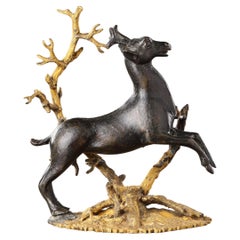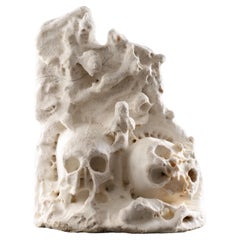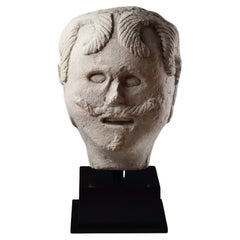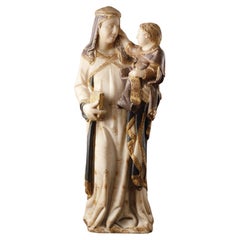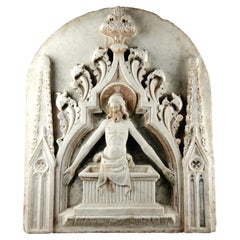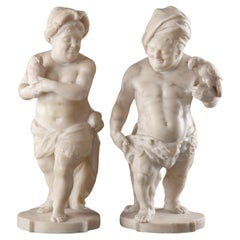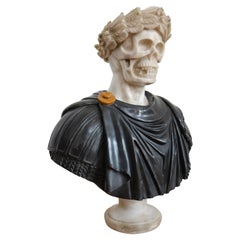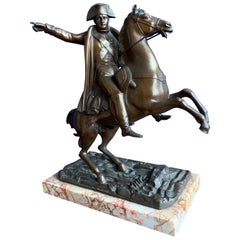Finch and Co Sculptures
to
1
6
6
5
4
1
1
1
6
6
3
1
1
1
Height
to
Width
to
6
6
6
A Small Bronze Group of a Prancing Stag
Located in London, GB
A Small Bronze Group of a Prancing Stag
Bronze, gilt bronze
South Germany; Nuremberg or Augsburg
Late 17th Century / Circa 1620
SIZE: 12cm high - 4¾ ins high
This bronze group, made in southern Germany, bears great similarities with the gilded silver table...
Category
Antique 17th Century German Animal Sculptures
Materials
Bronze
$18,000 Sale Price
20% Off
An Unusual and Rare English ‘Memento Mori’ Carved Shrine with Two Human Skulls
Located in London, GB
An Unusual and Rare English ‘Memento Mori’ Carved Shrine with Two Human Skulls to the underside, a carved ‘Dragonfly’
Marble
16th / 17th Century
England
Size: 36cm high, 28cm w...
Category
Antique 16th Century English Figurative Sculptures
Materials
Marble
European Carved Limestone Celtic Votive Head of a Male Warrior
Located in London, GB
A Large European Carved Limestone Celtic Votive Head of a Male Warrior Wearing a Typical Flowing Moustache Small Beard and Curling Locks of Hair Stiffened with Lime Wash the Slit Mouth Open as if in Command
Circa 1st Century BC - 1st Century AD
Size: 31cm high, 22cm wide, 25cm deep - 12¼ ins high, 8¾ ins wide, 9¾ ins deep / 42cm high - 16½ ins high (with base)
From about 500 BC, first Greek and later Roman historians mention peoples living in a large area of non-mediterranean Europe as Celts. These classical chroniclers seem to have recognised these communities as having sufficient shared cultural traditions to justify their being given a common name, ‘Keltoi’ by the Greeks, and ‘Celtae’ or ‘Galli’ by the Romans. The earliest allusions to Celts by such Greek historians as Herodotus (485 - 425 BC) were followed by Polybius (200 - 118 BC) and Livy (59 BC - AD 17) who discuss the expansion of the Celts from their central European homelands during the 4th and 3rd centuries BC. They document the presence of Celts in Spain, France, Italy, Greece and Asia Minor, specifically central Turkey. They testify to the successful Roman resistance to the Celts in Italy, after the ignominy of the sacking of Rome by them in 387 BC, and describe the huge defeat suffered by the Celts at the battle of Telemon in northern Italy in 225 BC. The Celts in Greece who sacked the sacred site of Delphi in 279 BC were defeated by King Antigonos Gonatas of Macedon in 278 - 277 BC and in Turkey by Altalus of Pergamon in 240 BC. The Celts in Spain fell under the shadow of Rome from 2nd Century BC and the Celtic heartland known by the Romans as ‘Gaul’ was conquered by the Romans under Julius Caesar in the mid 1st Century BC. Britain was not referred to as Celtic by the ancient historians, but Caesar recognised the close similarities between Britain and Gaul especially in their political organisation. Tacitus (55 - 120 AD) and others chronicled the conquest of Britain between 43 and 84 AD some mentioning the fierce nature of the Celts who went into battle naked.
Celtic art therefore belongs to an artistic tradition in the early history of Europe which is no less important than that of the classical world. Art was central to Celtic identity and was closely related to the objects which it decorated. The Celts were used to seeing art as an integral part of their everyday lives.
Provenance:
Ex Finch and Co...
Category
Antique 15th Century and Earlier European Busts
Materials
Limestone
A Polychrome and Parcel-Gilt Marble Group of the Virgin and Child
Located in London, GB
A Polychrome and Parcel-Gilt Marble Group of the Virgin
and Child
Attributed to Giovanni Di Balduccio (1317 - 1349)
Marble
Italy
Circa 1330 - 1340
SIZE: 65cm high, 28cm wide - 25½ ins high, 11 ins wide
PROVENANCE:
Possibly Trivolzio Collection, Milan
With Piero Tozzi Inc., New York
Acquired by the William Randolph Hearst Foundation for The Los Angeles County Museum (A.5832.47-42), 1947
An auction of property de-accessioned by the Los Angeles County Museum of Art to benefit new acquisitions...
Category
Antique 15th Century and Earlier Italian Figurative Sculptures
Materials
Marble
A Very Rare and Important Marble Relief of the ‘Resurrection of Christ’
Located in London, GB
A Very Rare and Important Marble Relief of the ‘Resurrection of Christ’
Attributed to the Master of the Mascoli Altar
Marble
Venice, Italy
Second half of the 15th Century
SIZE: ...
Category
Antique 15th Century and Earlier Italian Renaissance Figurative Sculptures
Materials
Marble
A Superb Pair of Neapolitan Carved Figures of Dwarves
By Francesco Celebrano
Located in London, GB
A Superb Pair of Neapolitan Carved Figures of Dwarves
Attributed to Francesco Celebrano (1729 - 1814)
Marble
Naples, Italy
18th Century
SIZE: Male: 36cm high - 14¼ ins high
Fe...
Category
Antique Late 18th Century Italian Figurative Sculptures
Materials
Marble
Related Items
19th Century Italian Roman Vanitas Bust Renaissance Revival Memento Mori Marble
Located in Ijzendijke, NL
Masterfully carved & most impressive Italian Vanitas bust in solid marble from late 19th century.
White Carrara marble skull combined with a Belgian Bla...
Category
Antique Late 19th Century Italian Renaissance Revival Busts
Materials
Marble, Belgian Black Marble, Carrara Marble
$15,957
H 29.53 in W 23.63 in D 11.03 in
French Antique Stately Bronze Napoleon on Prancing Horse Sculpture, Marble Base
Located in Lisse, NL
Handcrafted. Practical size sculpture of imperator Napoleon Bonaparte.
If you are a collector of good quality antiques having to do with (French) historical figures then this rare a...
Category
Antique Late 19th Century French Empire Animal Sculptures
Materials
Marble, Bronze
$2,562
H 11.25 in W 9.5 in D 5 in
18th Century French Carved Oak Panel Depicting Two Angels And An Eagle
Located in Buisson, FR
Beautiful weathered oak panel depicting two baroque angels and an eagle standing on rams heads .
Weathered and small losses, most likely it was once part of a larger panel.
France ci...
Category
Antique 18th Century French Baroque Figurative Sculptures
Materials
Oak
$576 Sale Price
50% Off
H 11.82 in W 22.25 in D 3.55 in
"Resurrection" – A Series of Figural Sculptures - 1970s
Located in Antwerp, BE
A striking and enigmatic collection of four plaster sculptures, crafted in the Netherlands during the 1970s. Each figure, with its abstract, crouching form, evokes a sense of raw emo...
Category
Late 20th Century Figurative Sculptures
Materials
Plaster
Fine Pair of Intricately Carved Marble Garden Foo Lion Figures
Located in Bridgeport, CT
A pair of opposing foo lions with elaborately carved curled fur and seated on bases. One places a paw on a ball, the other on an upside down baby foo lion. Overall fine time worn sur...
Category
Mid-20th Century Ming Statues
Materials
Marble
19th Century Renaissance Marble Relief
Located in Madrid, ES
19th century Renaissance marble relief.
The relief is carved to the Renaissance taste and is in very good condition. It is framed in a later frame ...
Category
Antique 19th Century Italian Renaissance Figurative Sculptures
Materials
Marble
German Nude Male Warrior, Otto Schmidt Hofer, ca. 1910
By Otto Schmidt Hofer
Located in Petaluma, CA
A patinated bronze sculpture after German sculptor Otto Schmidt Hofer (1873-1925). Titled, "The Enemy Below." A figural work featuring a handsome nude male Greek...
Category
Vintage 1910s German Beaux Arts Figurative Sculptures
Materials
Bronze
Rare Regency Memento Mori Box
Located in Kittery Point, ME
Decorated with four skulls to top with titles of a Witch, King, Beauty and Beggar to each Skull underneath. Lidded.
Category
Antique 19th Century English Regency Decorative Boxes
Life-Size Carved Wood Sculpture of a Man's Head circa 1700 South European
Located in Boven Leeuwen, NL
Stunning life-size carved wood sculpture of a man's head dating from circa 1700 in the south of Europe.
Category
Antique 1690s European Renaissance Figurative Sculptures
Materials
Wood
$4,076
H 11.82 in W 7.88 in D 8.67 in
Japanese Haniwa Terracotta Head of a Warrior
Located in Hudson, NY
Japanese Haniwa terracotta head of a warrior, Haniwa figures are Japanese terracotta funerary figures that accompanied the dead buried in early Japan, ...
Category
Antique 15th Century and Earlier Japanese Antiquities
Materials
Terracotta
Carved Deer Skull Object
Located in Tokyo, Tokyo
A sculpted object of a deer with sculpture.
A sculpture of a complex pattern directs a slightly different atmosphere.
Category
Vintage 1950s Indonesian Tribal Animal Sculptures
Materials
Horn
Memento Mori in Wood with Chrismon, Monogram of Christ, Italy End of 17th Cent
Located in Milan, IT
A Memento Mori in wood with Chrismon, monogram of Christ. Valuable sculpture in fruit wood in almost true-to-life measurements, sculpted with art and finished with a wealth of details. The wood was covered with a thin layer of pellet and finished in color.
Immediately above the forehead, in correspondence with the anterior neonatal fontanel, the CHRISMON is painted in purple red. The monogram of Christ or Chi Rho (or CHRISMON) is a combination of letters from the Greek alphabet, which form an abbreviation of the name of Christ. Solar in nature, often inscribed in a circle with multiple rays reminiscent of the cosmic wheel deriving from the ancient solar emblems of Egypt. The symbol consists of two large overlapping letters, the 'X' and the 'P'. They correspond, respectively, to the Greek letter '?' ('chi', which reads kh, aspirated) and '?' ('rho', which reads r). These two letters are the initials of the word '???st??' (Khristòs ), the name of Jesus, which in Greek means "anointed" and translates the Hebrew "messiah". On the sides of these two letters, there are very often two others: one 'a' and one '?', alpha and omega...
Category
Antique Late 17th Century Italian Figurative Sculptures
Materials
Wood
$4,076
H 5.5 in W 5.5 in D 7 in
